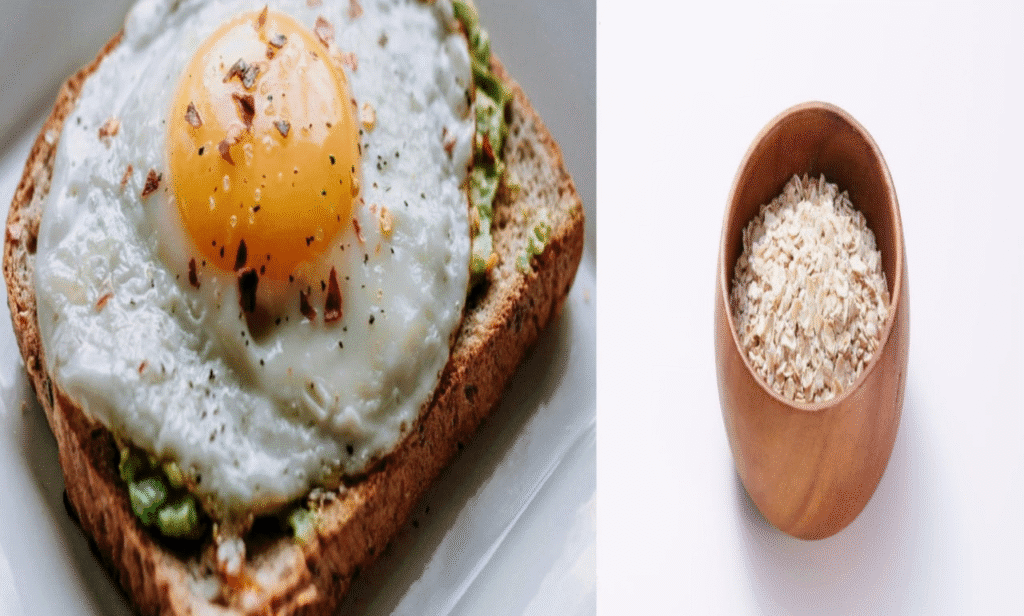
The age-old breakfast debate continues: should you start your day with a plate of savory, protein-packed eggs or a warm, fiber-rich bowl of oatmeal? This isn’t just a matter of taste; it’s a question about which option provides the best nutritional foundation for your day. Both are celebrated as healthy choices, but they cater to different bodily needs and health goals.
We consulted with registered dietitian nutritionists to break down the science of protein and fiber, helping you decide whether eggs or oatmeal deserves a spot on your morning table.
The Case for Eggs: A Protein Powerhouse
When it comes to high-quality protein, eggs are a standout choice for breakfast.
Satiety and Muscle Maintenance: A single large egg contains about 6-7 grams of complete protein, meaning it provides all nine essential amino acids your body cannot produce on its own. This protein is crucial for building and repairing tissues and, importantly, for promoting feelings of fullness (satiety). A protein-rich breakfast like eggs can help curb mid-morning cravings and reduce overall calorie intake throughout the day.
Nutrient Density: Beyond protein, eggs are a treasure trove of vital nutrients. They are one of the best dietary sources of choline, essential for brain health and liver function. They also contain lutein and zeaxanthin, antioxidants that protect eye health, along with Vitamin D and B12.
Debunking the Cholesterol Myth: For years, eggs were controversial due to their cholesterol content. However, extensive research has shown that for most people, dietary cholesterol from eggs has a minimal effect on blood cholesterol levels. The focus has shifted to the greater impact of saturated and trans fats.
The Case for Oatmeal: The Champion of Fiber
Oatmeal earns its stellar reputation primarily from its impressive fiber content, offering a unique set of benefits for health.
Heart Health and Digestion: Oatmeal is rich in a specific type of soluble fiber called beta-glucan. This fiber is renowned for its ability to help lower LDL (“bad”) cholesterol levels, directly supporting heart health. It also aids in digestion by slowing it down, which helps regulate blood sugar levels, preventing the sharp spikes and crashes associated with sugary cereals.
Sustained Energy: The complex carbohydrates in oatmeal, combined with its fiber, provide a slow and steady release of glucose into the bloodstream. This makes it an excellent breakfast for sustained energy, keeping you fueled and focused for hours. It’s a fantastic choice for anyone with an active morning or those managing blood sugar.
Versatility and Gut Health: Oatmeal serves as a perfect canvas for other nutritious toppings. Adding berries, nuts, and seeds can boost its fiber, protein, and antioxidant profile even further. The fiber in oatmeal also acts as a prebiotic, feeding the beneficial bacteria in your gut.
The Verdict: Which One is Better for You?
So, should you eat eggs or oatmeal? According to dietitians, there is no single winner. The “better” choice depends entirely on your individual body, health objectives, and daily activities.
Choose Eggs if: Your primary goal is to increase protein intake for muscle building, enhance feelings of fullness to support weight management, or you simply prefer a savory, low-carb breakfast.
Choose Oatmeal if: You are focused on improving heart health by lowering cholesterol, need sustained energy for a long morning, want to improve your digestive health with more fiber, or are following a plant-based diet.
The Ultimate Solution: Combine Them!
You don’t necessarily have to choose. For a truly balanced and powerful breakfast that covers all bases, consider combining both. Imagine a bowl of steel-cut oatmeal topped with a perfectly cooked fried egg and a sprinkle of herbs. You get the slow-burning carbohydrates and fiber from the oatmeal, combined with the high-quality protein and fats from the egg. This synergistic combination maximizes satiety, stabilizes blood sugar, and provides a broad spectrum of nutrients to optimize your health.
Ultimately, the best breakfast is one that is nutrient-dense, satisfies you, and that you enjoy eating consistently.
Frequently Asked Questions (FAQ)
Q1: I have high cholesterol. Should I avoid eggs for breakfast?
A: For most individuals, current scientific evidence indicates that dietary cholesterol from eggs has a much smaller effect on blood cholesterol levels than previously thought. The primary drivers are often saturated and trans fats found in processed foods, fried items, and baked goods. However, individual responses can vary. It is always best to consult with your doctor or a registered dietitian for personalized advice based on your specific health profile.
Q2: How can I make my oatmeal higher in protein?
A: You can easily boost the protein in your oatmeal by:
- Cook it with milk or a fortified plant-based milk instead of water.
- Stir in a scoop of protein powder or Greek yogurt after cooking.
- Topping it with nuts, seeds (like chia or hemp seeds), or a dollop of nut butter.
Q3: Is one type of oatmeal healthier than another?
A: Yes. Less processed oats like steel-cut or rolled oats have a lower glycemic index and retain more fiber than instant oatmeal packets, which often contain added sugar and salt. For the best health benefits, choose whole oat varieties and flavor them yourself with fruit and spices like cinnamon.
Q4: Are there people who should avoid one of these breakfasts?
A: Individuals with certain medical conditions, such as celiac disease (must ensure oats are certified gluten-free) or egg allergies, should avoid one or the other. For those with diabetes, paying attention to portion sizes and added sugars in oatmeal is key. Always seek guidance from a healthcare professional for dietary restrictions.
